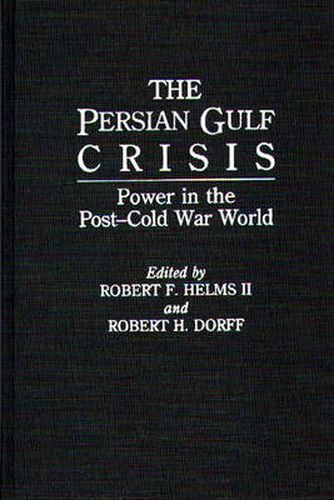Readings Newsletter
Become a Readings Member to make your shopping experience even easier.
Sign in or sign up for free!
You’re not far away from qualifying for FREE standard shipping within Australia
You’ve qualified for FREE standard shipping within Australia
The cart is loading…






This text examines the implications of the Persian Gulf crisis in order to enhance our understanding of the post-Cold War international system. More than just another analysis of the Iraqi invasion of Kuwait and the subsequent war, the book looks at the more general aspects of the use of force (political, economic, and military) evident in the Gulf crisis and what they can tell us about the emerging post-Cold War system. Contributors were selected on the basis of their ability to address specific questions and policy issues, and to cast their analyses at a broadly theoretical level. Each chapter looks at a different aspect of conflict in the international system and how that relates to the Persian Gulf crisis. Several aspects of the crisis and the new international system are examined such as the role of the United Nations, the utility of economic sanctions, the historical origin of the crisis itself, the potential sources of conflict and responses to it, and the changing nature of the use of military force. To the extent that the lessons found contradict the common wisdoms that emerged in the immediate aftermath of the war, many of the chapters challenge the trend to find sweeping generalizations in the Gulf crisis that bear directly on international relations in the 1990s and beyond. Civilian and military policymakers, as well as students and teachers of international studies, will find this book of interest.
$9.00 standard shipping within Australia
FREE standard shipping within Australia for orders over $100.00
Express & International shipping calculated at checkout
This text examines the implications of the Persian Gulf crisis in order to enhance our understanding of the post-Cold War international system. More than just another analysis of the Iraqi invasion of Kuwait and the subsequent war, the book looks at the more general aspects of the use of force (political, economic, and military) evident in the Gulf crisis and what they can tell us about the emerging post-Cold War system. Contributors were selected on the basis of their ability to address specific questions and policy issues, and to cast their analyses at a broadly theoretical level. Each chapter looks at a different aspect of conflict in the international system and how that relates to the Persian Gulf crisis. Several aspects of the crisis and the new international system are examined such as the role of the United Nations, the utility of economic sanctions, the historical origin of the crisis itself, the potential sources of conflict and responses to it, and the changing nature of the use of military force. To the extent that the lessons found contradict the common wisdoms that emerged in the immediate aftermath of the war, many of the chapters challenge the trend to find sweeping generalizations in the Gulf crisis that bear directly on international relations in the 1990s and beyond. Civilian and military policymakers, as well as students and teachers of international studies, will find this book of interest.